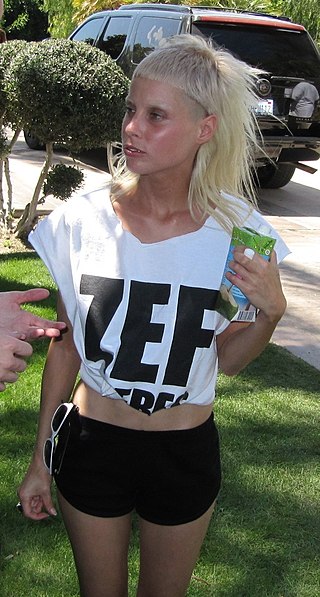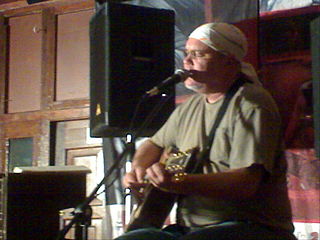Related Research Articles
A protest song is a song that is associated with a movement for protest and social change and hence part of the broader category of topical songs. It may be folk, classical, or commercial in genre.

Ralph Christian Möbius, known professionally as Rio Reiser, was a German musician and from 1970 to 1985 the lead singer and main lyric-writer for the rock group Ton Steine Scherben. After that band broke up, he worked as a solo artist. Among his best known songs are Macht kaputt, was euch kaputt macht, Keine Macht für Niemand, and the Rauch-Haus-Song with the Ton Steine Scherben. As a solo artist, his best known songs are König von Deutschland, Alles Lüge, and Junimond. Reiser supported squatting in the early 1970s and later the green political party Die Grünen. After the German reunification, he joined the Party of Democratic Socialism.

The South African music scene includes both popular (jive) and folk forms like Zulu isicathamiya singing and harmonic mbaqanga. Other popular genres are marabi, kwaito,house music, pop music, isicathamiya, gqom, rock music, hip hop and amapiano.

Pieter-Dirk Uys is a South African performer, author, satirist, and social activist. One of his best known roles is as Evita Bezuidenhout, an Afrikaner socialite.

Orania is a white separatist South African town founded by Afrikaners. It is located along the Orange River in the Karoo region of the Northern Cape province. The town is split in two halves by the R369 road, and is 871 kilometres (541 mi) from Cape Town and approximately 680 kilometres (420 mi) from Pretoria. Its climate is semi-arid.

Zef is a South African counter-culture movement. Kyle Hans Brockmann has compared zef counter-culture to many similar anarchic sub-cultures in the northern hemisphere.
The South African College Schools is a public English medium primary and high education institution situated in Newlands - part of the Southern Suburbs region of Cape Town in the Western Cape province of South Africa. Founded in 1829, it is the oldest continuously run school in South Africa.
Johannes Kerkorrel, born Ralph John Rabie, was a South African singer-songwriter, journalist and playwright.

Anton Fig, also known as "The Thunder from Down Under", is a South African session drummer, perhaps best known as the drummer and second-in-command for Paul Shaffer and the World's Most Dangerous Band. David Letterman, for whom the band served as house band on his late-night talk shows, often referred to Fig as "Anton Zip" or "Buddy Rich Jr." Fig is also well known for his work with Kiss, Ace Frehley and Joe Bonamassa.

Hartenbos is a town in the Western Cape province of South Africa. It is located some 45 kilometres outside George, South Africa. It belongs, together with 20 other settlements, to the Mossel Bay Local Municipality. Originally a farm, the South African Railways and Harbours turned it into a holiday resort for their lower-rung employees in 1933.

Shifty Records was a South African anti-apartheid record label founded by Lloyd Ross and Ivan Kadey in 1982/3, which existed for around ten years.

Koos Kombuis is a South African musician, singer, songwriter and writer who became famous as part of a group of anti-establishment maverick Afrikaans musicians, who, under the collective name of Voëlvry, toured campuses across South Africa in the 1980s, to "liberate Afrikaans from the shackles of its past". Fellow musicians of this movement were Johannes Kerkorrel and Bernoldus Niemand.

James Phillips was a South African rock musician, vocalist, songwriter, and performer. He performed rebellious and satirical political music that spoke out against the South African government during Apartheid.

Vrye Weekblad is a progressive Afrikaans national weekly newspaper that was launched in November 1988 and forced to close in 28 May 1994, then relaunched as a online newspaper in 2019. The paper was noted for its anti-apartheid stance making it a notable outlier in the Afrikaans language media of the 1980s and early 1990s. The paper was initially driven into bankruptcy by the legal costs of defending its charge that South African Police General Lothar Neethling had supplied poison to security police to kill activists.

Afrikaners are a Southern African ethnic group descended from predominantly Dutch settlers first arriving at the Cape of Good Hope in 1652. Until 1994, they dominated South Africa's politics as well as the country's commercial agricultural sector.

Eet Kreef is the first studio album by Johannes Kerkorrel and the Gereformeerde Blues Band. Released in 1989 on the now-defunct Shifty Records label, the album was a commercial success despite its tracks being banned from radio airplay by the South African Broadcasting Corporation.

Willim Welsyn aka William Welfare, is a South African rock singer-songwriter, filmmaker and an award-winning podcaster originally from Ladismith in the Western Cape. He is better known as the lead singer and guitarist for the Afrikaans Rock band, Willim Welsyn en die Sunrise Toffies and as former photographer, features writer and podcast host for the South African Rolling Stone magazine and for his weekly Afrikaans podcast show WAT Met Willim Welsyn Podcast.
The Voëlvry movement in South Africa was a genre of anti-apartheid music sung in Afrikaans. The term Voëlvry means both "free as a bird" and "outlaw". This movement has been said to have started on April 4, 1989 in Johannesburg in a packed club. This marked the beginning of what some have called a rock and roll uprising. The Voëlvry movement used music in the Afrikaans language to show pride. The movement focused on Afrikaner youth. The main goal of the movement was to get Afrikaner youth to see the changes that had to occur in the “authoritarian, patriarchal culture”.

The apartheid regime in South Africa began in 1948 and lasted until 1994. It involved a system of institutionalized racial segregation and white supremacy, and placed all political power in the hands of a white minority. Opposition to apartheid manifested in a variety of ways, including boycotts, non-violent protests, and armed resistance. Music played a large role in the movement against apartheid within South Africa, as well as in international opposition to apartheid. The impacts of songs opposing apartheid included raising awareness, generating support for the movement against apartheid, building unity within this movement, and "presenting an alternative vision of culture in a future democratic South Africa."
References
- ↑ "'n Gesprek Met Dirk Ace (Deel 1 van 2) – Ep. 8 WAT Podcast" . Retrieved 17 March 2017.
- 1 2 Hopkins, Pat (2006). Voëlvry: the movement that rocked South Africa. Cape Town: Zebra Press. p. 151.
- ↑ "Artists: Koos". Shifty Records. Retrieved 17 March 2017.
- 1 2 "Waar is die alternatiewe Afrikaners 'n dekade na Boereblues en Voëlvry" . Retrieved 17 March 2017.